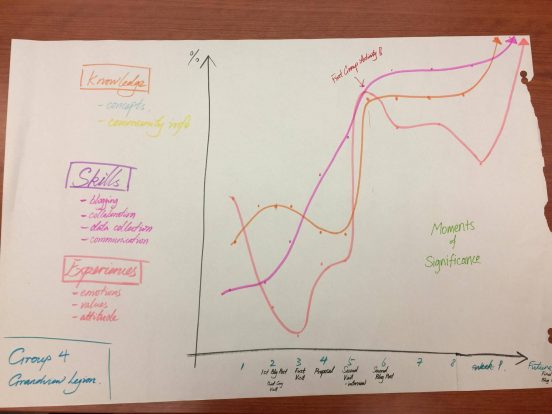Group 4 / Blog Post #3 / Nov. 6, 2016
Objective
– Prepare for [possibly] the next visit to Grandview legion and plan for an interview with other stakeholders of the legion.
– Integrate food justice and indigenous food sovereignty perspectives that we learnt in lectures in addressing the food-related issues in the Grandview Legion.
– Discuss how cultural background and social factors may influence how we engage in our food system positively.
– Understand “uncertainties + resolution” in our learning environment. Prepare for managing and adapting to changes and outcomes in our community project (Shulman, 2015).
– Analyze the information that we gathered from our interview and observation in the Grandview legion.
Achievements
– Started working on the final report and infographic!
– Created graph of “Moments of Significant Change.” We discussed and presented the progressions of our knowledge, skills and experiences throughout the term so far, which helped us bond as a group through sharing our thoughts and reflections.
– Conducted effective and productive group meetings. We actively discussed what we learnt from readings and lectures and we contributed collaboratively to our blog post and final report.
…………………………………………………………………………………
Moment of significant Change
During our tutorial, we had the chance to do a “Moments of Significant Change” workshop, in which we got together as a group and did some reflecting on 3 main categories which were skills, experiences and knowledge and how they have changed as the term has progressed.
This activity was a fun and interactive way of reflecting on the highs and lows of our work as a group! There were times where our work was efficient and we were able to meet the objectives we had set for ourselves, but there were also times when we had conflicts with the distribution of work and our communication skills, which greatly affected our work as a group.
It was also really interesting to be able to look back at what our expectations of this course were like in the beginning and how they’ve changed. This workshop allowed us to look back and highlight our achievements and recognized all the lessons we’ve learned. With LFS 350’s unconventional class structure, we were happy to realize that we’ve progressed.
We are aware that it is not easy for all members to share the same ideas and mindsets when working in a group, but an activity like this one proved to be very helpful with establishing a common objective and making sure every group member is on the same page. By looking back at the times during which our work was not the best and when our group work dynamic wasn’t flowing like we wanted it to, we were able to discuss the areas that need improvement and agree on what we want to do if we are faced by any uncertainty as we reach the end of the term.
Over and over again, our confusion and uncertainty has been met with encouragement from the teaching team. Our group struggled with the idea of working on something with a purpose but not a clear-cut goal. Shulman (2005)’s piece on ‘Pedagogies of uncertainty’ was definitely a clarifying moment of significant change. It helped us accept our work as productive and possibly modified our approach as we near the final project. So, although there is still a lot of uncertainty in our project, as a group, we (and L. S. Shulman) feel like we have enough confidence in ourselves to overcome it.
…………………………………………………………………………….……
Strategy for Successful Project Completion
We believe that a successful project will accurately describe the way in which the legion and its kitchen facilities have the potential work as an important asset for the Grandview Community. Our group’s strategy for successful project completion is;

- Research
- Review our interview recording and ensure that all of the necessary information has been collected; if need be we will once again go to the Grandview community and gather any missing information that will enhance our final report/infographic.
- Interpret and analyze our observational data comprehensively and comparatively by comparing our data with official databases (City of Vancouver, legion website, Statistics Canada), and conduct evidenced-based community-assessment focus on the legion specific population and geographic features.
- Collate the information we gathered from our interviews with the observational data that we have collected on the Grandview community
- Incorporate other academic information about low income senior food insecurity and relate our findings. This will demonstrate how what we find builds on or relates to other research conclusions and why that is significant.
- Talk about our failures
- Taking from the podcast “Failure Is Your Friend: A New Freakonomics Radio Podcast” we will carry out a “pre-mortem” thinking critically about what in our project is most likely or has the potential to fail. At our next meeting me will try and imagine what potentially could lead to the failure of the project and run through this process before the failure or mistake occurs, being proactive and then taking steps to try and avoid this failure.
- As Tim Harford mentioned in his talk (2015), How frustration can make us more creative, we always regard any difficulty and conflict as the stimulate for achieving better team creativity and performance.
- Focus on teamwork
- The factor that underpins all of this strength and success is teamwork and communication amongst group members.
- Continue to “check in” with one another to ensure that we are staying on track and all team members are actively participating and staying on top of their commitments. Managing our time as well as our workload now will make the coming weeks more successful and less stressful.
- Stay determined and disciplined with our timeline as the term progresses and the conclusion of the project draws closer.
“Coming together is a beginning. Keeping together is progress. Working together is success.” –Henry Ford
- Communication
- We will work to communicate efficiently within the group and with our TA, meeting to review our project proposal to ensure that we are on the strongest path going forward
- Stay in contact with the people in the Grandview legion.
- Practice and Preparation
- A strong finish will require the successful completion and presentation of our infographic. In order to do this we will meet to orally practice and finalize each of our roles to make sure we are comfortable and well prepared.
The ultimate goal of our Final Report is to make a contribution to the understanding of the importance of legions as an asset for positively impacting community food insecurity, the report will also allow for better decision making about support for existing and future kitchen facilities and programs, and if we are able to do this we will consider ourselves successful and strong.
………………………………………………………………………………………
References:
Cohn, G. (2015). Failure Is Your Friend: Podcast. Freakonomics. Retrieved online from http://freakonomics.com/podcast/failure-is-your-friend-a-new-freakonomics-radio-podcast/
Harford, T. (2015). How Frustration Can Make Us More Creative. TED Talk. Retrieved online from https://www.ted.com/talks/tim_harford_how_messy_problems_can_inspire_creativity?language=en
Shulman, L. S. (2005). Pedagogies of uncertainty. Liberal Education, 91(2), 18–25. Retrieved from http://files.eric.ed.gov/fulltext/EJ697350.pdf
